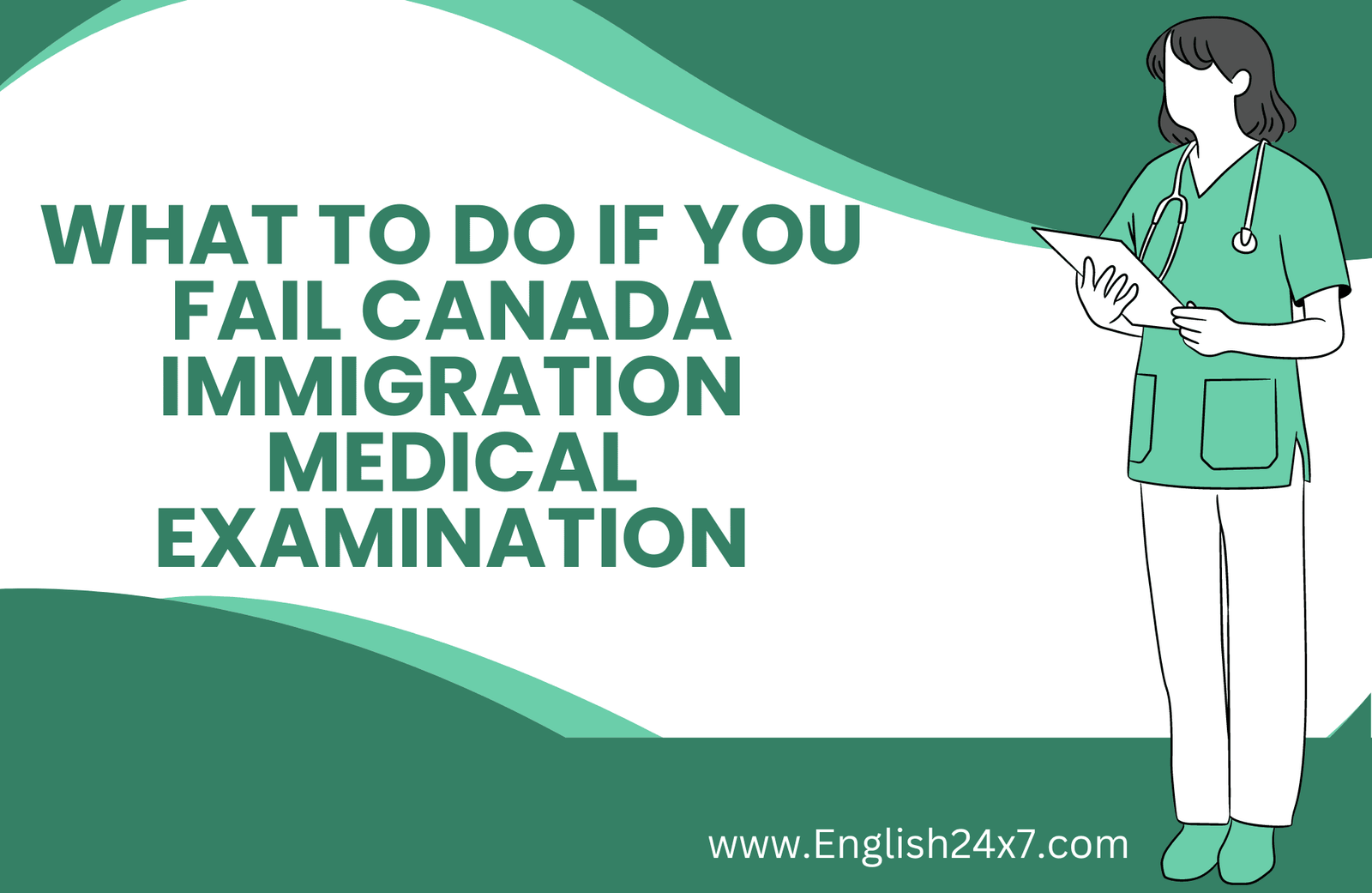
What to Do If You Fail Canada Immigration Medical Examination
Medical Examination : Embarking on the journey to immigrate to Canada is an exciting and life-changing decision.
However, the immigration process comes with its challenges, and one significant hurdle many applicants face is the medical examination.
In this article, we will explore the steps to take if you find yourself in the situation of failing the Canada immigration medical examination.
Importance of the Medical Examination
The significance of the medical examination in the context of Canada's immigration process cannot be overstated.
Canada places an utmost priority on the well-being, health, and safety of its residents.
The primary purpose of the medical examination, therefore, is to safeguard the public health of the country.
In essence, the Canadian immigration authorities want to ensure that individuals seeking to immigrate do not carry communicable diseases or health conditions that could potentially pose a risk to the broader population.
This precautionary measure aligns with the government's commitment to maintaining a healthy and secure living environment for all Canadians.
By conducting a thorough medical examination, Canada aims to identify and address health concerns at the outset of the immigration process.
This proactive approach helps prevent the entry of individuals who might inadvertently bring infectious diseases or conditions that could strain the country's healthcare system or compromise the well-being of its citizens.
In addition to protecting the local population, the medical examination serves to protect the health and welfare of the newcomers themselves.
Identifying and addressing health issues early in the immigration process allows individuals to seek necessary medical attention, make lifestyle changes, or undergo treatment before their arrival in Canada.
Receiving the News
Receiving the news of a failed medical examination is undoubtedly a challenging moment in the immigration journey, and it requires a thoughtful and strategic approach.
Here's a detailed exploration of the process of receiving this news and the subsequent steps to take:
Emotional Response
Discovering that you have failed the medical examination can evoke a range of emotions, from disappointment to frustration and perhaps even anxiety about the implications for your immigration prospects.
It's crucial, however, to resist immediate emotional reactions and strive to maintain a calm and focused mindset.
Seeking the Medical Report
The first concrete step after learning about the failure is to obtain the detailed medical report provided by the panel physician.
This report outlines the specific reasons for the failure and provides insights into the health concerns that led to the unfavorable result.
Understanding this information is vital as it forms the basis for your next course of action.
Understanding the Reasons
Take the time to thoroughly review the medical report.
The reasons for failure could range from specific health conditions to incomplete or inaccurate documentation.
Understanding the exact reasons is pivotal for devising a plan to address and rectify the issues.
Consulting with the Panel Physician
If certain aspects of the medical report are unclear or require further clarification, consider scheduling a follow-up consultation with the panel physician.
This discussion can provide additional insights, potential solutions, or avenues for seeking a second opinion.
Seeking Emotional Support
Dealing with a failed medical examination can be emotionally taxing.
It's crucial to seek support from friends, family, or counseling services to help navigate the emotional aspects of the situation.
Having a strong support system can make a significant difference in maintaining a positive outlook.
Developing a Plan of Action
Once armed with a clear understanding of the reasons for the failure, it's time to develop a comprehensive plan of action.
This plan should address each specific issue outlined in the medical report.
Whether it involves seeking medical treatment, undergoing further tests, or updating documentation, a well-structured plan is essential.
Considering a Second Opinion
If you disagree with the results or suspect any inaccuracies, it may be worthwhile to seek a second opinion from another panel physician.
This step can provide an independent assessment of your health status and either validate the initial results or identify potential errors.
Legal Consultation
Given the complexities of immigration processes, consulting with an immigration lawyer is a prudent step.
A legal professional can provide guidance on the best course of action, potential remedies, and the overall impact of the failed medical examination on your immigration prospects.
By approaching the situation with a clear mind, seeking detailed information, and developing a strategic plan, individuals can navigate this setback with the aim of addressing the underlying issues and preparing for a successful reapplication.
Seek a Second Opinion
Disagreeing with the results of a medical examination is a challenging situation, but it's important to remember that medical assessments can be subjective, and errors can occur.
Seeking a second opinion is a crucial step in ensuring the accuracy of the initial examination. Here's an in-depth exploration of this process:
Reasons for Disagreement
Before seeking a second opinion, it's essential to identify the specific reasons for disagreeing with the initial results.
This could include concerns about the interpretation of medical data, the diagnosis of a particular condition, or the overall assessment of your health status.
Choosing Another Panel Physician
The next step is to identify and consult with another qualified panel physician.
Look for a professional with expertise in immigration medical examinations and who is recognized by the relevant authorities.
This ensures an unbiased and independent assessment of your case.
Sharing Previous Medical Records
When consulting the second panel physician, provide them with a comprehensive set of your medical records, including the results and report from the initial examination.
This transparency helps the new physician understand the context and make a more informed assessment.
Seeking Clarifications
During the consultation with the second panel physician, ask questions and seek clarifications on any aspects of the initial examination that seem unclear or questionable.
This dialogue can provide valuable insights into the differences between the two assessments.
Considering Discrepancies
If there are significant discrepancies between the initial and second opinions, it may be necessary to discuss these with both physicians.
Understanding the reasons behind the differences can shed light on potential areas of misinterpretation or error.
Documenting the Second Opinion
Once you have obtained the second opinion, document the findings and recommendations.
This documentation may be crucial if you decide to appeal the initial results or if you need to provide evidence in your reapplication process.
Addressing Health Issues
In cases where the failure is attributed to specific health issues, proactive steps must be taken to address these concerns. Here's a detailed exploration of this critical aspect:
Understanding the Health Issues
Start by gaining a comprehensive understanding of the specific health issues identified in the medical examination.
This understanding forms the basis for developing a targeted plan for improvement.
Consulting Specialists
If the health issues require specialized attention, consider consulting with relevant medical specialists.
Their expertise can provide tailored insights and guidance on the most effective treatments or interventions.
Seeking Treatment
Follow through with recommended treatments or interventions. This may involve medication, therapy, or other medical procedures.
Consistency and adherence to prescribed treatments are key to demonstrating commitment to addressing health concerns.
Undergoing Further Tests
In some cases, additional tests may be necessary to monitor progress or provide more detailed information about the health condition.
Be proactive in undergoing these tests and share the results with relevant medical professionals.
Lifestyle Changes
Incorporate positive lifestyle changes that contribute to overall health improvement.
This could include adjustments to diet, exercise routines, stress management, or any other factors relevant to your specific health situation.
Documenting Efforts
Maintain detailed records of all efforts made to address the identified health issues.
This documentation serves as tangible evidence of your commitment to improving your health, which can be valuable when reapplying for immigration.
Consulting an Immigration Lawyer
Navigating the immigration process, especially after a failed medical examination, can be complex.
Consulting with an immigration lawyer is a wise decision.
They can provide insights into your specific situation, advise on potential remedies, and guide you through the process of reapplication.
Understanding Inadmissibility
Certain medical conditions may render an individual inadmissible to Canada. Understanding the specific grounds for inadmissibility is crucial.
If your condition falls under this category, your lawyer can guide you on the available options or waivers that may apply to your case.
Reapplying for Immigration
Once you've addressed the issues that led to the initial failure, it's time to reapply for immigration.
Be thorough in providing documentation of your efforts to rectify the health concerns, and ensure all required forms are completed accurately.
Get information on reapplying for immigration on www.celpip.biz and the official IRCC website.
Highlighting Positive Changes
In your reapplication, emphasize the positive changes you've made since the initial examination.
This could include medical treatment progress, lifestyle modifications, or any other steps taken to address the health issues.
Providing a clear narrative of improvement strengthens your case.
Preparing for a Follow-Up Medical Examination
In some cases, immigration authorities may require a follow-up medical examination.
Be prepared for this possibility and ensure that you maintain open communication with the panel physician.
Demonstrating cooperation and commitment to meeting health standards is vital.
Conclusion
Failing a Canada immigration medical examination is undoubtedly a setback, but it's essential to view it as a temporary hurdle rather than an insurmountable obstacle.
By taking proactive steps, seeking professional advice, and showcasing positive changes, applicants can increase their chances of a successful immigration journey.
Remember, persistence and a well-documented reapplication can turn the tide in your favor.
Frequently Asked Questions (FAQs)
Q1. What should I do if I fail the Canada immigration medical examination?
Remain calm and focused. Understand the reasons for the failure by reviewing the detailed medical report provided by the panel physician.
Q2. Can I seek a second opinion if I disagree with the results?
Yes, it's advisable to consult another panel physician for an independent assessment to ensure the accuracy of the initial examination.
Q3. How do I address specific health issues that led to the failure?
Take proactive steps, such as seeking treatment, undergoing further tests, or making lifestyle changes to improve overall health.
Q4. Is it important to document efforts made to address health issues?
Yes, maintaining detailed records is crucial. It provides valuable evidence of your commitment when reapplying for immigration.
Q5. Should I consult with an immigration lawyer after a failed medical examination?
Yes, consulting with an immigration lawyer can provide guidance on potential remedies, the reapplication process, and legal aspects of your situation.
Q6. Can I request a follow-up consultation with the panel physician?
Yes, scheduling a follow-up consultation can provide additional insights and clarifications regarding the reasons for the failure.
Q7. Are there specific grounds for inadmissibility due to health conditions?
Yes, certain medical conditions may render an individual inadmissible to Canada. Understanding these grounds is crucial when addressing a failed examination.
Q8. How can I emphasize positive changes when reapplying for immigration?
Highlight improvements in your reapplication by showcasing positive changes, such as progress in medical treatment or lifestyle modifications.
Q9. Can lifestyle changes contribute to overcoming health issues?
Yes, positive lifestyle changes, such as adjustments to diet and exercise, can contribute to overall health improvement.
Q10. Is it necessary to undergo further tests if recommended by a physician?
Yes, being proactive and undergoing additional tests as recommended by medical professionals can provide valuable insights into your health status.
Q11. Can I appeal the results of the medical examination?
Depending on the circumstances, it may be possible to appeal. Consulting with an immigration lawyer can guide you on the best course of action.
Q12. How should I prepare for a follow-up medical examination if required?
Be prepared by maintaining open communication with the panel physician, demonstrating cooperation, and ensuring you have addressed any identified health concerns.
You may also check How to Fill Canada Immigration Form Direct Links Included.



